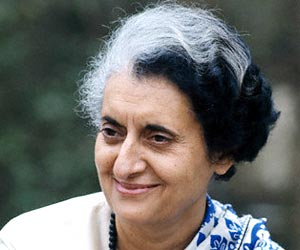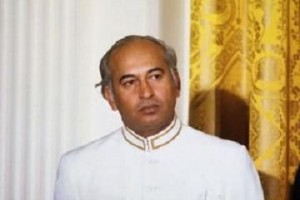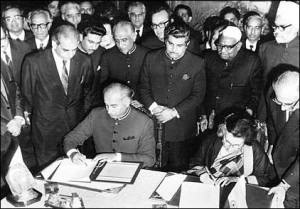Peace Watch » Editor's Take, Featured » Hurriyats Not Third Party?
Hurriyats Not Third Party?
Simla Agreement Syndrome
Z.G. Muhammad
India and Pakistan, on August 23, 2015 after cancelling National Security Advisors talks added another sad chapter to their long history of acrimony and mistrust. In July, Prime Ministers of two countries during summit in Ufa had agreed upon holding talks at the level of National Security Advisors. Notwithstanding, scepticism about holding of these talks looming large, after political commentators in New Delhi started looking at the joint statement issued at the summit as India’s greatest diplomatic victory over Pakistan – the arch rival and in Islamabad, the commentators denouncing it as goof-up by Nawaz Sharif and Sartaj Aziz, the two countries decided to hold the talks on August 24-25.
 The suspense over the talks started building up after Pakistan invited the Hurriyat to a reception meeting with Sartaj Aziz. India saw it as a violation of the “redline” it had drawn at the time of cancellation of Secretary-level talks in 2014. Statements from the two side hyped by the nationalistic corporate media cast their shadow on these talks. And finally the press conferences by Pakistan NSA, Sartaj Aziz and External Affairs Minister Shusha Swaraj wrote an epitaph on these talks. In his press Conference Sartaj Aziz saying no to any preconditions, including the ‘redlines’ showed his readiness for the meeting. Sushma Swaraj by invoking the Simla Agreement over Pakistan inviting the Hurriyat sparked a new debate. That calls for revisiting this 43 year old agreement.
The suspense over the talks started building up after Pakistan invited the Hurriyat to a reception meeting with Sartaj Aziz. India saw it as a violation of the “redline” it had drawn at the time of cancellation of Secretary-level talks in 2014. Statements from the two side hyped by the nationalistic corporate media cast their shadow on these talks. And finally the press conferences by Pakistan NSA, Sartaj Aziz and External Affairs Minister Shusha Swaraj wrote an epitaph on these talks. In his press Conference Sartaj Aziz saying no to any preconditions, including the ‘redlines’ showed his readiness for the meeting. Sushma Swaraj by invoking the Simla Agreement over Pakistan inviting the Hurriyat sparked a new debate. That calls for revisiting this 43 year old agreement.
In her statement, External Affairs Minister raised two points. One, that ‘in the spirit of the Simla Agreement, there can be no third party, and keeping in mind the spirit of the Simla Agreement, don’t make Hurriyat a third party to talks and second, that in the spirit of the Ufa statement, the NSA level talks would be limited to terrorism, Pakistan is saying that Kashmir is core issue but they did not say so in Ufa. Talk on terror first, we can talk on Kashmir later.’ The second point is not subject of this column.
Since the birth of the Hurriyat Conference, in 1993, it is for the first time that the GOI has officially seen it as “third party” to the Kashmir Dispute. The party – now split in four factions at no point of time has pleaded for itself the status of “third party.” The Multi party combine unlike its predecessor party like the Plebiscite Front does not see implementation of the UN resolution as the only solution for the resolution the dispute. Talking about “its struggle directed against” what it terms as “the forcible and fraudulent occupation of the State by India and for achievement of the self-determination” in its constitution in chapter 2 clause II, it talks about making endeavours for an alternative negotiated settlement amongst all the three parties viz (a) India, (b) Pakistan and (C) People of Jammu and Kashmir, under the auspices of UN or any other friendly countries. Provided that such settlement reflects the will and aspiration of the people”. Seen in right perspective, the party does not consider itself as the third party but recognizes the people of Jammu and Kashmir as principal party to the dispute. This stand in fact is in the spirit of the commitment made by the first Governor General, Lord Mountbatten and Prime Minster of India, Jawaharlal to people of the state. That ‘the question of accession of the state will be settled by reference to people under international auspices like the United Nations.’ In fact, it has been the National Front, NDA and UPA governments that by entering into dialogue with the Hurriyat leaders both on the track one and track two have tacitly recognized the multi-party combine as the ‘third party’. The idea of Delhi-Srinagar, Srinagar-Islamabad dialogue was not born in Srinagar but in New Delhi. Ironically, it was I. K. Gujral, Prime Minister of India (1997-1998) who in 1996 inaugurated Office of the Hurriyat Conference in New Delhi. The setting up of this office was seen as an opportunity for promoting dialogue between New Delhi and Srinagar both by the establishment and political dispensation in the capital.
Having repeatedly said that the UNSC resolutions on Jammu and Kashmir and agreements thereof, including the Karachi Agreement have lost their relevance, New Delhi’s stated position on Simla Agreement so far has been that it continues to be in force. In all situation for last four decades, it has hinged India-Pakistan relation to this agreement thus wittingly or unwittingly recognizing that Kashmir problem is the fulcrum in the relations of two countries. So Sushma Swaraj in choose a wrong alibi in stating that making Hurriyat as “third party” was against the spirit of the Simla Agreement for cancelling the NSA level talks. Not to speak involving the Hurriyat in dialogue process for ‘final settlement’ of the Kashmir Dispute, the Simla Agreement read in right spirit no makes Kashmir Dispute just a bilateral issue between India and Pakistan.
The deliberations between June 28 to 3 July 1971, between India and Pakistan belie many a propaganda about this agreement. The drafts exchanged between teams of the counties, the exchanges of Ideas both during close door meetings and outside the meeting halls and the final agreement signed at the Simla Conference when studied carefully reveals that fundamentally there has been no change with principles laid down by the United Nations for the resolution of the problem, it has only proposed an alternative way out for addressing it.
India in its initial draft had omitted reference to Charter of the United Nation and had incorporated final settlement of Jammu and Kashmir in it. Pakistan did not want to Kashmir to be brought on the table as the conference was about return of the POWs and taking armies back to before war positions on the international border and the Ceasefire line. After first draft, couple of drafts were exchanged and discussed by the two teams, including at one to one level between Mrs. Gandhi and Nehru. However, in the Simla Agreement, that was signed at midnight on July 3, 1972, the para one of the agreement reads, “That the principles and purposes of the Charter of the United Nations shall govern the relations between the two countries.”
Thus, the very first paragraphs of Simla Agreement binds, the two countries to ‘fulfil in good faith the obligations assumed by them in accordance with the Charter’. Under this very charter India had taken the dispute over future of Jammu and Kashmir to UNSC and the august body had adopted resolutions for holding plebiscite in the state. So the paragraph one of the Simla Agreement, makes it incumbent on India to respect and implement the UN resolution on Jammu and Kashmir. In para 4(ii) incorporation of words “without prejudice to the recognized position of either side”, by Bhutto in his own handwriting ended all talk about the control line having the status of the dispute or converted CFL into de facto border. In para 1 (ii), the phrase “or by any other means” after phrase “bilateral negotiations” gives the two countries freedom to get the dispute resolved through the ‘third party’ mediation as well. In the last paragraph of the agreement, the two countries had agreed that ‘respective heads will meet at mutually convenient date to discuss “final settlement of Jammu and Kashmir’. This in itself nailed the propaganda that changing nomenclature from Ceasefire Line to the Line of Actual Control had changed the status of Kashmir Dispute.
In times, when both India and Pakistan were committed to holding of Plebiscite in Jammu and Kashmir and Nehru had not reneged his promise to people of Jammu and Kashmir and envoys appointed by UN were exploring possibility of demilitarization and holding of plebiscite in the State, India and Pakistan were also simultaneously engaged in bilateral talks like Nehru-Liquate Ali Khan talks, Nehru-Bogra Talks and Swaran Singh Bhutto talks. So when in Simla Agreement agreed to discuss Kashmir bilaterally, there was nothing new in it. The two countries fully well knew that a bilateral agreement cannot replace an international agreements. That is why, neither New Delhi and nor Islamabad formally brought this agreement before the UNSC, where Jammu and Kashmir continues to be on the agenda as a dispute. In fact, the myth of bilateralism tagged to the Simla Agreement has been exploded on number of occasions, to quote a few, in 1993, New Delhi involved Iranian president, Rafsanjani to prevent Islamabad from taking Kashmir to UN and during Kargil War, Nawaz Sharif.
Filed under: Editor's Take, Featured · Tags: bhutto, Kashmir Dispute, Mrs. Gandhi, Nawaz Sharif Kashmir, NSA Talks, Simal Agreement, Z. G. muhammad








Simla agreement needs to be read in good faith and in right perspective in which it was agreed and signed between the parties. The very first para holds ” that the principles and purpose of the charter of United Nations shall govern the relations between the two countries”. Thus both parties do agreed to respect the charter of United Nations which make it incumbent on the parties to respect and resolve international dispute of kashmir being the signatories of UN resolutions on kashmir.
According the jurisprudence of international law all disputes among the nation’s having pending resolutions in UN don’t stand invalid by any unilateral or bilateral agreement unless all the parties to dispute come togather to withdraw the dispute in question as resolved otherwise to the satisfaction of the parties.
The simla agreement in its para 1 clause 2nd makes it abundantly clear after highlighting bilateral négociations that parties in question can go ” for any other means ” for the resolution of the problem. It can be trip party négociations, négociations initiated by third party or consensus among the parties to go for third party mediation etc. All options stand open.
When negociations to finalise the lanuage of simla agreement were passing through most difficult passage both indian and Pakistan teams were in impasse, it was one to one meeting between z. A.Bhutto and india Gandhi that solved the problem. About this meeting when Bhutto was asked how he succeeded he replied that he said to Indra Gandhi if America and Russia could solve their problems themselves why can’t they do the same. The point is that there was no intention of excluding kashmir and their leadership from participating in any future négociations or taking them as no party to the issue.
Kashmir being the root cause of the problem and fulcrum of the relations between the two countries, it’s people and leadership is a natural party to any negotiations thus can’t be treated third party but first party to any future solution with all sorts of legal and moral justifications flowing down from international law, charter do UNITED nations or equally from the very true notion and spirit of Simla agreement.